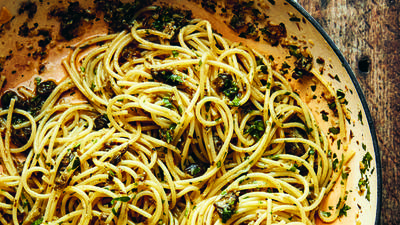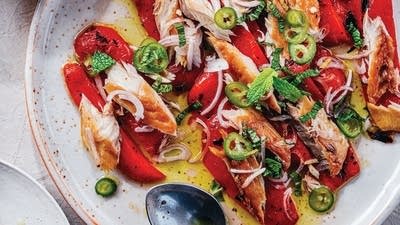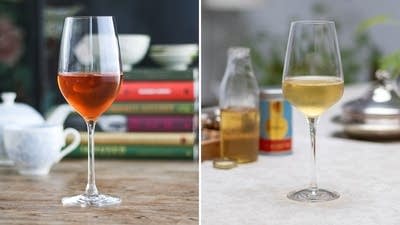
Author and restaurant critic Beth Dooley talks with Lynne Rossetto Kasper about what drove her to write about food, how she adapted to Minneapolis from her native New Jersey, and a new type of wheat that may change the future of farming.
Lynne Rossetto Kasper: I understand that when you were in school in New Jersey, you would secretly tuck The Joy of Cooking into your bag, pull it out, and hide it during study hall as you read it.
 Beth Dooley
Photo: Mary O'Brien
Beth Dooley
Photo: Mary O'Brien
Beth Dooley: I did. I read it like a novel.
LRK: How old were you?
BD: I think I was about 14, and I was fascinated by it. That first one had things in it like how to cook a squirrel.
LRK: That's true.
BD: It engaged my imagination in a pretty profound way. I also found reading recipes so comforting, maybe because a recipe is a memory of a happy meal, so they're stories with happy endings. I would read them, imagine what that meal would be like, then get excited and try to recreate them. When you're reading recipes from not only your own country but from other countries, you get a glimpse of different cultures. That was fascinating to me.
LRK: You get married, you go to college, and you drop in Minneapolis, Minnesota. Did you have some preconceptions about what you might be facing?
BD: Totally. This is the land of soy and corn where my father couldn't remember how to pronounce the name of the city we'd arrived in. He kept calling it "Midninapolis," and my brother gave us a poster of that New Yorker cover with Los Angeles on one side and New York on the other side, with nothing in between except the thin ribbon that was the Mississippi River.
I thought, "Wow, where am I?" It took me a long time to get my legs here. The first place we went to eat out was Becky's Cafeteria. I don't know if you remember that at all.
LRK: No, I don't.
BD: It was one of those places with velvet curtains you walked through. At the host stand there was a Bible open to Jeremiah 13:42 or something, and there was a big, long steam table. The food wasn't terrible. It was steamed food, but they always had beautiful pastries, wonderful pies, and really good bread. I thought that was interesting.
Then I hit the farmers market, and I felt like I had come home. The farmers market was representative of the kinds of food that I had eaten with my grandmother. I would meet these farmers and talk to them about their crops and what was happening in their fields, then bring this food home. All of the sudden, food tasted like food again.
I was of the generation where we have this vague memory of farm-fresh food, and then we lived through this period of convenience food. When you taste something that's grown locally, there's a tremendous difference. It made me curious about why that's so. You begin to peel back the onion and try to understand what defines flavor, and that leads you into all this other information around food. That's what happened.
LRK: That was the path, because in the book you write about individual foods: apples, wheat, chestnuts. But what ends up happening in each one of those chapters is government policy. You're talking about what farmers deal with. You're talking about things from several different points of view, and you obviously really started digging. Was there any one thing that set that off?
 Best Mashers
Best Mashers
BD: There was. The first real big project I had, having fallen in love with reading cookbooks, I decided early on I wanted to write cookbooks. I got to be friends with Lucia Watson. Lucia's Restaurant was the first farm-to-table restaurant in the Twin Cities, and Lucia was known as the Alice Waters of this region. She lifted up a lot of these small farmers and artisan cheese-makers and butter-makers, people that were engaged in the local economy. She understood as a local businesswoman that she needed to connect with people that were in her same local economy. It's that "when one does well, everyone does well" type of thinking.
She also understood, as a chef, that there was a big difference in the carrot that she bought from California versus the carrot that was grown down the street, flavor-wise. Her whole intent was to provide and cook with the best food she possibly could. Having learned from her, I began to think, "Wow, this makes so much sense." I started meeting the farmers that she was dealing with, and understanding both her point of view as a restaurateur and my issues as a home cook. How that might affect my landscape, and how that might affect what happens to our local economy when we're more intentional about who we buy from.
LRK: One of the things you talk about is, although you're writing about Minnesota, that this could be anywhere in the United States.
 In Winter's Kitchen
In Winter's Kitchen
BD: That's exactly right. That was one of the impetuses for writing the book--just being curious about where things come from and beginning to ask questions. It revealed so much to me. There's so much that is right here, things that grow right outside our back door, things that people are doing that are phenomenal, innovative, and interesting.
LRK: Give me some instances. They'll be about Minnesota, but they could be around the corner from anyone.
BD: One person we don't hear much about in Minnesota is a professor named Don Wyse, who has been engaged with Wes Jackson's work on perennializing wheat, for instance. That's a crop that would really change the wheat industry, because Don's argument is that we can't ask farmers to change their practices overnight, but what we can do is begin to research those plants that will make a dramatic difference both to the quality of food and how our land is used. But we have to give them different crops.
That's been the trajectory of his life for the past 30 or 40 years. He's a phenomenal human being. There's a lot of this work going on that we don't hear about because it's not big news yet, but it will be.
LRK: What they're working on for all this time is a wheat that you plant, and it comes back every year. You don't have to buy seeds. You don't have to replant.
BD: Correct. Think about it: wheat's a grass.
LRK: And a lawn comes back every year.
BD: Exactly right. It's a phenomenal product. It's called Kernza, and we'll start seeing it in the grocery stores soon.
LRK: If it could be a perennial, that would make such a difference. It would save people huge amounts of money and work.
BD: It would also be so much gentler on our land because you're not tilling and ripping things out every year in order to replant. You don't need the same amount of fertilizers and pesticides as you do with today's wheat.
 Daily Bread
Daily Bread
Before you go...
Each week, The Splendid Table brings you stories that expand your world view, inspire you to try something new, and show how food connects us all. We rely on your generous support. For as little as $5 a month, you can have a lasting impact on The Splendid Table. And, when you donate, you’ll join a community of like-minded individuals who love good food, good conversation, and kitchen companionship. Show your love for The Splendid Table with a gift today.
Thank you for your support.
Donate today for as little as $5.00 a month. Your gift only takes a few minutes and has a lasting impact on The Splendid Table and you'll be welcomed into The Splendid Table Co-op.




